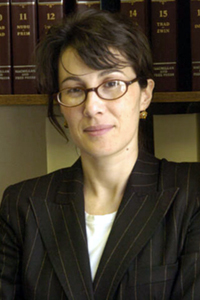Carnegie grant supports Zeghalís project on Islam
By Josh Schonwaldjschonwa@uchicago.edu
News Office
 Malika Zeghal |
|
The Divinity School’s Malika Zeghal has been named a 2009 Carnegie fellow for her commitment to enriching the quality of the public dialogue on Islam.
Zeghal is among a group of 21 young thinkers nationally who will receive a two-year grant of up to $100,000 from the Carnegie Corporation of New York.
Zeghal, Associate Professor of the Anthropology and Sociology of Religion in the Divinity School, received the award to support the completion of her forthcoming book Sacred Politics: The Contemporary Arab State, Secularity and Islam. The Carnegie Corporation singled out Zeghal for the work, which aims to challenge the conventional interpretation of secularity as a Western phenomenon that is closely associated with democratic practices.
A political scientist who studies religion through the lens of Islam and power, Zeghal is particularly interested in Islamist movements and in the institutionalization of Islam in the Muslim world, with an emphasis on the Middle East and North Africa in the post-colonial period and Muslim diasporas in North America and France.
Her forthcoming book is a comparative analysis of the role of Islam in Middle Eastern modern authoritarian states and in France’s secular democracy, which will entail an in-depth examination of Islamist movements in Egypt, Morocco, Tunisia and Jordan.
“I hope to produce a work that will deepen our understanding of Islamist political movements by demonstrating to what extent they are a by-product of state theologies and state regulation of Islam,” said Zeghal, who added that she hopes the book will be of interest to not only to scholars of religion and politics, but also to policymakers and the educated public.
“Her work revises reflexive and heretofore very misleading assumptions about both secularization and, not incidentally, state regulation of Islam,” said Richard Rosengarten, Dean of the Divinity School. “Rich in both information and perspective, it is a model for what the social sciences can teach us about religion. I am truly delighted that her work has been so splendidly recognized by her appointment as a Carnegie scholar.”
The Carnegie Corporation, founded by Andrew Carnegie in 1911, with a mission of “the advancement and diffusion of knowledge and understanding,” has focused heavily on advancing the public dialogue on Islam in recent years. Since 2002, the corporation has supported 117 thinkers who are focusing on Islam.
Commenting on the current focus on Islam, the Carnegie Corporation’s President Vartan Gregorian said, “We are cultivating a diverse scholarly community spanning a range of disciplines with the expectation that their voices will help Americans develop a more complex understanding of Muslim societies, here and throughout the world, revealing Islam’s rich diversity. Only through vibrant dialogue, guided by bold and nuanced scholarship, can we move public thinking into new territory,” said Gregorian.
![[Chronicle]](/images/sidebar_header_oct06.gif)